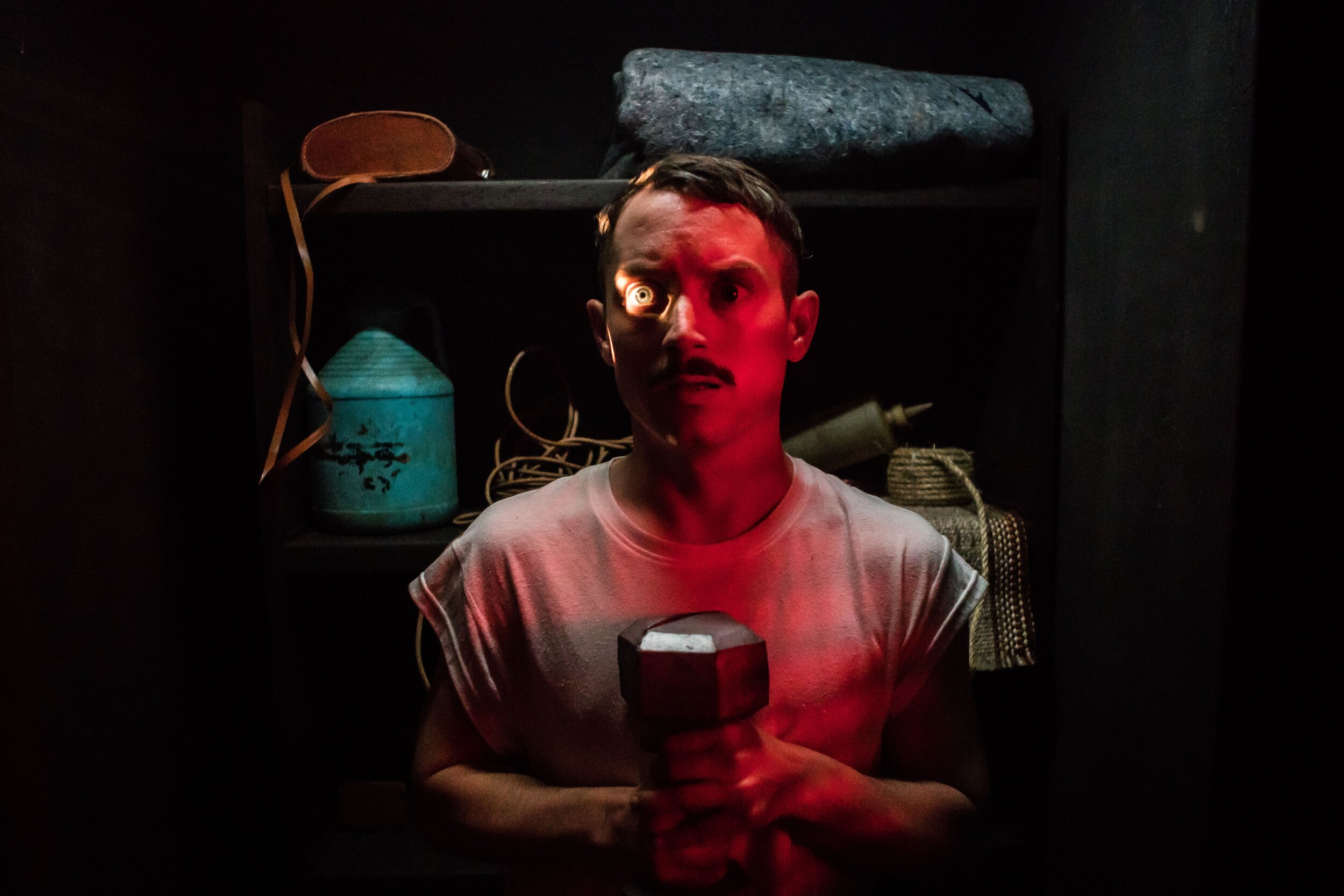[Review] Come to Daddy
When a movie begins by quoting both the biggest poet of the 16th Century, followed by the best poet of the 21st Century…you know you’re in for an odd ride. When you learn that the film was also directed by Ant Timpson, the producer of such oddities as Deathgasm and The Greasy Strangler, you just gotta hold onto your ass and enjoy the ride.
Norval Greenwood (Elijah Wood) arrives on a bus sporting 70s-styled mustache, an odd haircut and the kind of fedora typically associated with the Amish. He crosses through a forest, lugging his suitcase through the trees and across a beach. Pauses to check a hand-drawn map. Eventually he arrives at an oddly shaped house Norval eventually compares to a flying saucer that faces the sea as the title screen pauses mid-dramatic moment.
“Dad, it’s me,” he tells a barely open door. “I got your letter.”
The man on the other side of the door is Gordon (Stephen McHattie) and he looks a little confused to see the oddly dressed Norval standing outside his home. To be fair, Norval is a sight to behold. He looks like he raided David Rose’s rejected leftovers while gloating about a limited edition, solid gold iPhone (designed by Lorde, natch).
Meanwhile, Gordon looks like he’s been on a number of benders, one after the other. He used to be a limo driver for the stars and now that he’s retired he’s pretty unimpressed with any of the fancy things Norval tries to impress him with. Instead, Gordon asks him if he’s ever been in a fight. Of course Norval hasn’t. “I once accidentally kicked a guy’s ear off,” Gordon responds.
Norval wants to connect with his father. And he thinks the letter is the perfect opportunity. Gordon ran out on the family when he Norval was five and he hasn’t seen him since. He wants to know why Gordon wrote him out of the blue, after being out of the picture for thirty years. But mostly Norval wants closure and to understand why his father left him as a kid. Unfortunately, Gordon treats Norval like shit and acts as if he doesn’t want him there.
Things obviously aren’t going according to Norval’s plans. And he spends his days learning more and more about his father, while at night, as he lies awake in his little bed, his thoughts are filled with horrific thoughts. He also hears things moving in the night. The sound of something being dragged…
Come to Daddy is an odd movie befitting an odd title. It’s all about daddy issues, yes, but the way it presents them becomes a ludicrously mutating puzzle that keeps wrapping in on itself. Along the way, it dips its toes in a variety of horror and thriller subgenres as we get to know a cast of odd supporting characters like a man who has an excrement-encrusted pen (he pronounces it “extriment,” of course). Then there’s the cop who, in his words, doesn’t want to break the fourth wall but has a theory that “bad guys have eyes like raisins.” And while Norval has kind eyes, the cop says Gordon has raisin eyes.
“He called me a rat fucker,” Norval muses.
It clips along at an amusing, yet slowburn-filled, direction as Norval and the audience unwraps the mysterious onion of Gordon and the saucer-shaped house. Working from a script by Toby Harvard (who wrote The Greasy Strangler, as well), Timpson fills his film with odd characters and then lets the craziness fly. It’s a very odd film; one that, like Strangler before it, won’t mesh with everyone. The humor comes from splicing a truly horrific situation with moments of awkward humor, such as when Norval is attacked with a man who’s trailing toilet paper from the dispenser. And the gore is delivered in short, but sublimely painful and hilarious, spurts.
It loses its steam as it trudges into the third act and the action switches location. But I have to admire a film that refuses to stick to one tone or one type of narrative. The messy, protracted struggle becomes a kind of poignant metaphor for dealing with family issues and coming to terms with abandonment and daddy trauma. The way families can foist needless violence and trauma on each other.
Sometimes we get answers. Sometimes we don’t. Sometimes we discover that our fathers aren’t the people we thought they were. But, by the end of the day…they’re family. Sure, Shakespeare might say that the sins of the father are laid upon their children. But I think our 21st Century poet said it better:
“There’s no one else like my daddy”


![[Review] Come to Daddy](https://images.squarespace-cdn.com/content/v1/5b39608d75f9eef54c62c3f0/1581305150335-013G383EA0AX1O3UZSKL/BXVOKxJE.jpeg)


![[Review] And Then We Danced is a Glorious Coming-Of-Age Story](https://images.squarespace-cdn.com/content/v1/5b39608d75f9eef54c62c3f0/1581288027033-4DLA7GLAI0VFLUNR8YFB/MV5BMDJhYzE2MTUtYzBhZC00ZWRhLTkwNDctN2YxNGU3NzM2ZTE4XkEyXkFqcGdeQXVyNDU0NjMyNTQ%40._V1_.jpg)

![[Review] Luz](https://images.squarespace-cdn.com/content/v1/5b39608d75f9eef54c62c3f0/1563239938152-AQYC9IHBEQDHHBG8W54D/MV5BNTMyZWM0ODktNDFkYi00ZDU5LTkxNDEtODJjNDZlYTFhNTkzXkEyXkFqcGdeQXVyNTU4NDM4MDU%40._V1_.jpg)
![[Review] Artik is Like a Hammer to the Head](https://images.squarespace-cdn.com/content/v1/5b39608d75f9eef54c62c3f0/1567972819074-8I6GGVAM601KPMHYUIXY/-JWCqCpQ.jpeg)
![[Review] Killer Weekend Made Me Want to Go Watch a Better Movie](https://images.squarespace-cdn.com/content/v1/5b39608d75f9eef54c62c3f0/1582399537370-HJFV1ZCW85CCLDIOEZE9/unnamed%282%29.jpg)